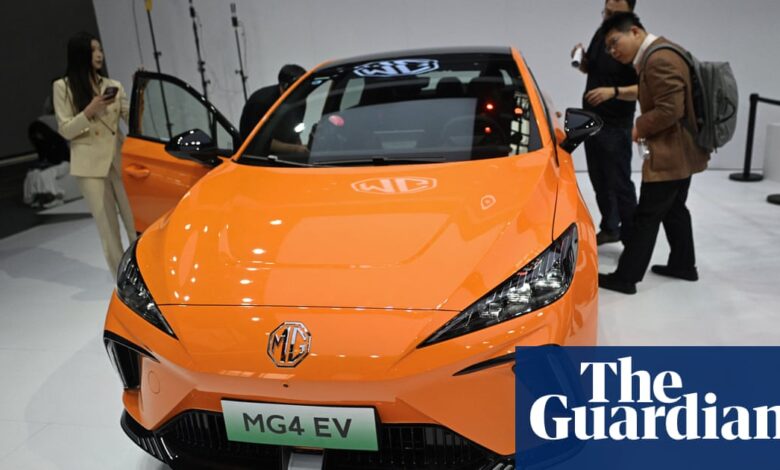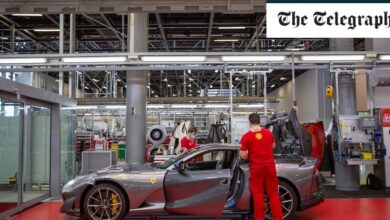Tesla among electric carmakers forced to cut prices as market stalls | Automotive industry

Elon Musk became the world’s richest man by evangelising about electric cars – and delivering them by the million. Yet in recent months his company, Tesla, has struggled to maintain its momentum: sales have dropped this year, and so has its share price.
Those struggles have become emblematic of a broader reckoning facing the electric vehicle (EV) industry. After the soaring demand and valuations of the coronavirus pandemic years, the pace of sales growth has slowed. The industry has entered a new phase, with questions over whether the switch from petrol and diesel to cleaner electric is facing a troublesome stall or a temporary speed bump.
Musk acknowledged the difficulties this week, telling investors: “The EV adoption rate globally is under pressure, and a lot of other auto manufacturers are pulling back on EVs and pursuing plug-in hybrids instead.” Musk, of course, insisted that was the wrong decision.
The sales slowdown is real, however. Tesla and its nearest rival in electric car volumes, China’s BYD, have both reported lower electric car sales. Across Europe, battery electric cars slipped to a 13% share of all sales, down from last year’s 13.9%, while sales of hybrids – which combine a battery with an internal combustion engine – rose to 29% from 24.4%. In the UK, electric cars accounted for 15.5% of total car sales in the first three months of 2024, only marginally up from the same time last year.
In recent years electric car manufacturers have been able easily to sell every electric car they have made. Yet now, businesses across much of the world are struggling with the end of the era of rock-bottom interest rates, which has left less money in household pockets.
“The economic headwinds are quite ugly in general, so it doesn’t surprise me that we’re having a slowdown,” said Ian Henry, whose AutoAnalysis consultancy works with several carmakers.
Buyers must still pay more upfront for battery cars (although most would save money by owning an electric vehicle because of cheaper energy). And electric car repair costs and insurance costs can be higher in some places because of a shortage of mechanics. Another important factor is the very patchy introduction of public electric chargers, which is giving some potential buyers cause to pause. All of that has been leapt upon by sceptics of the EV industry – and made them a battleground in the culture wars.
The hand of government
Rico Luman, a senior sector economist covering automotive at ING, an investment bank, said that EV sales had hit a “plateau”, and that it would get harder to sell electric cars after the initial rush of early adopters comfortable with switching from petrol and diesel.
However, there is more going on with the showdown than purely economic factors. Governments are also a playing a major role. That is particularly evident across Europe, where EV sales are taking diverging paths even though buyers face similar pressures. Norway is an outlier. With heavily subsidised electric car sales, EVs now make up 90% of the market. The EV market share has also increased this year in Denmark, Belgium and France.
However, it has declined in Germany, once the biggest electric car market, for one simple reason: the government has withdrawn subsidies.
As well as affecting demand, regulation is also playing a big role in what cars are on offer. Matthias Schmidt, a Berlin-based electric cars analyst, has long expected European electric sales growth to slump during 2024. That is because 1 January 2025 is the date on which the EU takes its next big step towards zero-emissions vehicles: the average carbon dioxide emissions of cars sold by each manufacturer must fall by 15% compared with 2021.
The rules therefore provide a major incentive for carmakers to focus their electric car efforts on next year. Schmidt argues that the European industry is going through a “replication” of the situation experienced in 2019, when manufacturers held back their electric cars, before launching a barrage of new models in 2020.
Sure enough, carmakers are releasing new mass-market models just in time. Renault’s electric 5 hatchback will cost less than €25,000 (£21,430) when sales begin this autumn, while Ford is due to launch an electric version of the UK’s bestselling car, the Ford Puma, later this year.
Moaning manufacturers
Stellantis, the owner of the Vauxhall, Peugeot Fiat and Chrysler brands, is also joining the rush: it unveiled its electric Vauxhall/Opel Grandland SUV on Tuesday. But that has not stopped its chief executive, Carlos Tavares, from complaining bitterly about how regulations are enforcing the pace of the switch to electric.
after newsletter promotion
This week he harangued the UK’s transport minister, Mark Harper, over the government’s zero emission vehicle (ZEV) mandate, which will force carmakers to sell an increasing proportion of electric cars. He then claimed to journalists that the mandate was a “terrible” policy because it was forcing carmakers to introduce electric models too quickly.
He said: “The consequence of this is that everybody will start pushing the BEV [battery electric vehicle], pushing the metal into the market, which then totally destroys profitability, which then destroys the companies.”
Schmidt said carmakers’ complaints may have an ulterior motive. The EU rules will ban most internal combustion sales by 2035, but they are due for review in 2026.
“Lots of manufacturers complaining now that it’s unrealistic to meet those targets is a lobbying message by stealth,” Schmidt said. “They’ve done it so often it’s almost a case of the boy that cried wolf. There’s definitely a hidden agenda in their moaning.”
But other manufacturers have already slowed their shift, which will mean selling petrol models – which are still more profitable – for longer. In the US, General Motors last year delayed production from a factory in Michigan, while Ford postponed construction of a plant in Kentucky. And in the UK, the luxury carmaker Bentley last month said it would delay its first battery car for a year to 2026.
“Manufacturers are definitely struggling at the moment strategically,” said Luman. “They’re now playing around with the timing of models, but not postponing it too far. Otherwise they’ll miss the boat in terms of market share.”
Perhaps the biggest reason European and US carmakers are unlikely to reverse course on EVs is China. Growth in Chinese sales may have slowed in the first quarter of 2024 compared with last year, but they still topped a million, according to industry data cited by Reuters. A host of Chinese carmakers – including the leader BYD and new, well-funded entrants such as phone maker Xiaomi – are battling to dominate their home market and win a new role as the world’s biggest car exporter.
The German chancelllor, Olaf Scholz, on his recent trip to China, argued against protectionism and said Chinese manufacturers must still have access to the European market – acutely aware that penalising Chinese EVs would meet swift retaliation against Germany’s carmakers.
For electric carmakers, the huge competition is biting – forcing even Tesla to cut prices to keep selling its cars. That competition will cause car executives sleepless nights – and could force some to merge or face bankruptcy, which could cause job losses. But it could also push prices down further, making electric cars cheaper than petrol equivalents.
“It’s potentially a good thing for consumers,” said Ian Henry. “Whether it’s a good thing for manufacturers who are trying to make money is a different question.”



